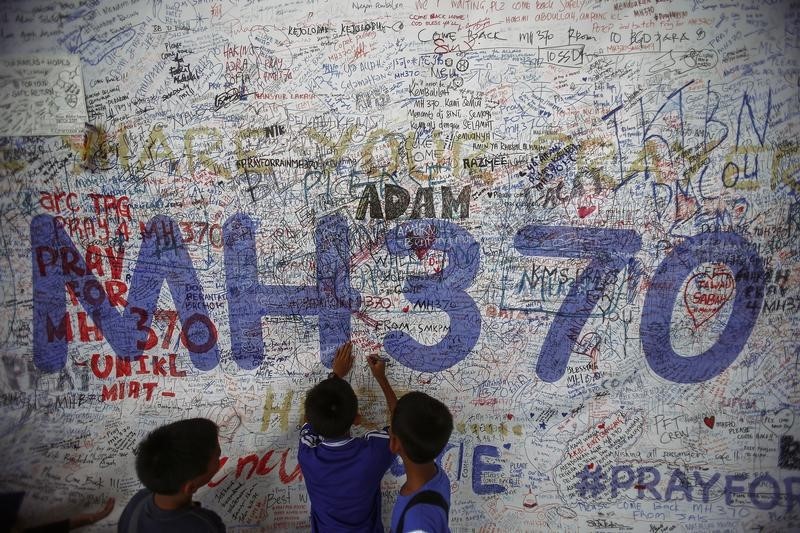By Allison Lampert and Allison Martell
MONTREAL (Reuters) - Aviation leaders will try to secure a mandate to implement new safety standards when they meet next week after a string of high-profile accidents around the world made 2014 the deadliest year for commercial airlines in almost a decade.
Efforts to adopt new standards for global plane tracking and co-operation on the risks of flying over conflict zones will dominate the meeting on safety in Montreal from Feb. 2-5, weeks ahead of the anniversary of the disappearance of flight MH370, the Malaysian Airlines jet with 239 people on board.
Regulators and officials at the meeting will have to juggle political sensitivities and arguments over the budgets of cash-squeezed airlines.
"Issues such as flight restrictions over conflict zones can only be tackled at a global or regional level," Patrick Ky, executive director of the European Aviation Safety Agency, said.
"The global aviation regulatory system should also act more quickly to address the recommendations for safety improvement made by accident investigators," he told Reuters ahead of the talks at the International Civil Aviation Organization.
While statistics suggest flying is safer than ever in proportion to the amount of traffic, 924 people were killed in passenger accidents last year, the worst for loss of life since 2005, shaking perceptions of air travel worldwide.
Last year's disappearance of a Malaysia Airlines jet, and the downing of a sister plane on flight MH17 over Ukraine with a combined loss of 539 lives, pose one of the biggest challenges to the 70-year-old U.N. organization since security threats in the 1970s and 1980s.
"Like hijackings in the 1970s, the Korean Airlines 007 fighter jet shootdown, and the Pan Am 103 bombing, the downing of MH17 represents an abhorrent, watershed moment in civil aviation history," said Pillsbury Law partner Kenneth Quinn, a former U.S. official who took part in a task force on the issue.
Airlines have called for controls on weapons such as the high-altitude ground-to-air missile suspected of shooting down MH17 over eastern Ukraine last July, and greater sharing of intelligence information on threats.
MH17 was hit during fighting between Ukraine and pro-Russian separatist rebels in eastern Ukraine. The United States said the plane was hit with a ground-to-air missile by rebels. Russia says a Ukrainian military aircraft downed it.
NO FAIL-SAFE METHODS
ICAO, one of the international institutions which sprang out of World War II, is credited with making it safer to fly by ensuring coordination in standards across the globe.
But getting collaboration when it comes to disputed territory can be tough. Some major intelligence agencies were invited to take part in preparatory ICAO talks on conflict zones but didn't show up, two people familiar with the discussions said.
Faced with the reluctance of most countries to share highly sensitive information, ICAO has proposed overhauling a system of notices to pilots to ensure that what data already exists is more widely available and able to be cross-checked.
"No system for identifying, verifying, and sharing threat information is fail-safe, but a centralized database at ICAO at least ensures that identified threat information gets shared on a more widespread and timely basis," Quinn said.
That is likely to disappoint airlines that have said it is the responsibility of states to tell them what they know.
On tracking, however, airlines have displayed divisions over the costs of installing new systems, while several competing business groups will be lobbying on the sidelines of ICAO.
Senior officials involved in the discussions said the recent AirAsia crash was not part of the UN debate because the jet was within controlled airspace and its flight recorders were found relatively quickly after delays mainly due to bad weather.
Next week's conference is likely to call for planes to send tracking signals at regular intervals in normal flight and to speed them up when they get into trouble. It is also looking at ejectable black boxes as one way to aid searches and solve mysteries like that of the missing MH370.
But in December, the International Air Transport Association, which represents over 200 carriers, refused to back a call by an industry-wide committee that had met under its own leadership to install existing systems on its planes within 12 months.
A strong ICAO mandate to impose flight tracking would also need national measures to take effect. The European Union is expected to move quickly to make them law, an EU official said.

But some delegates have expressed concerns that the global response to last year's shock events could be weakened if there is only patchy compliance with the new recommendations.